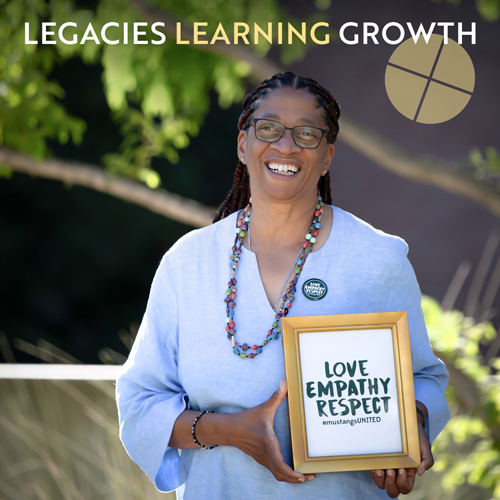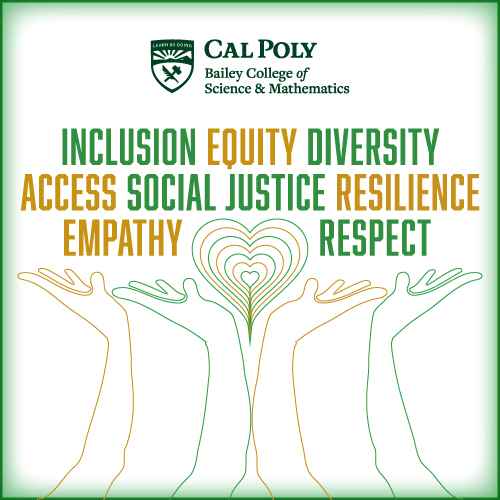Cal Poly takes on Climate Action: Broad Initiative Seeks Solutions Towards Environment Sustainability
March 8, 2023
By Nick Wilson
Cal Poly’s first climate symposium in 2020 at Baker Center explored a number of topics concerning environmental sustainability and ways of addressing challenges, inspiring the university’s Initiative for Climate Leadership and Resilience.
The group was formed at a challenging time when new planning had to be curtailed due to the arrival of the pandemic. Now in 2023, the Initiative is taking full effect this year.
Led by Erin Pearse, a Cal Poly math professor, the program has established a variety of programs working on and off campus that take on climate action.
“Our mission is to connect people with the right sort of emotional motivation to be engaged,” Pearse said. “Climate action is needed here and now, and the economy is going to be requiring it very shortly. It’s much more concrete and immediate than I think people understand.”
The Initiative supports a number of research and service-learning activities, with eco-focused projects built into classroom instruction and a large fall sustainability conference.
Cal Poly also is one of the recipients of a $10.6 million grant from AmeriCorps College Fellowship for the College Corps program. The grant offers student fellowships in cooperation with the Center for Service in Action.
Students work with government agencies, schools and nonprofits on climate action goals such as electric vehicle readiness, building decarbonization, urban plantings, climate-related planning, educational outreach and many more.
Covering two years, the College Corps program award is spread out among a consortium including Cal Poly, Cuesta College, Hancock College and CSU Long Beach.
College Corps currently provides $10,000 for 450 hours of work for about 165 Cal Poly students, who can get academic credit. Of the stipend, $7,000 is for living expenses and $3,000 is for educational costs.
Rairaja Cohen, a fourth-year nutrition major of Arcata, is promoting sustainability through organic farming and education of K-12 students at the nonprofit City Farm SLO.
She works with students at elementary schools and nearby Pacific Beach Continuation High School to teach eco-friendly agriculture, also helping to cultivate crops with tenant farmers.
“I personally have learned a lot about how agriculture affects the climate and, in turn, shared that information with (K-12) students,” Cohen said. “It’s great to teaching kids about how the agricultural systems and smaller sustainable organic farms can impact the climate positively."

Cal Poly nutrition major Rairaja Cohen teaches young students about parts of a plant
Marine sciences major Angelo LaCommare-Soto, of San Francisco, served on campus through College Corps interning with the Green Campus Team on a range of activities related to resource reuse, such as a pilot program on diverting graduation attire from the landfill.
“I have enjoyed working with sustainability-oriented and motivating peers,” LaCommare-Soto said. “We’re making slow, yet substantial progress, towards a less wasteful Cal Poly campus.”
Allie Mortensen, an environmental management and protection major, of Orange County, also works with the Cal Poly Green Campus Team, helping coordinate fashion swaps to keep discarded clothes out of the landfill and the FLOW Challenge (“For the Love of Water”) encouraging shorter showers, reporting of leaks and only doing laundry when they have a full load.
College Corps students also have played key roles in supporting the Resilient SLO Challenge organized through the SLO Climate Coalition, which gamifies ways for community members to reduce household carbon emissions like switching out gas with electrical appliances and landscaping with drought-tolerant plants.
“We like to use the concept of the Venn diagram that outlines what you’re good at, what you’re interested in and what you’re passionate about, and getting people to understand that there are climate change projects at the intersection of all three,” Pearse said. “You don’t have to give up what you want to do with your life. There’s a way to connect with the direction that you’re already moving in.”

The Initiative team works here a project called the Sustainable Land Initiative designing and fabricating specialized equipment for regenerative agriculture.
More jobs now require climate literacy and postings have increased attention on sustainability, Pearse said.
“In places like Europe and Taiwan, businesses must form sustainability plans and provide them for bankrolling projects,” Pearse said. “And in the U.S., pretty quickly all jobs are going to be green jobs. The workforce will need to have that level of background knowledge.”
Cal Poly’s Initiative for Climate Leadership and Resilience was kickstarted by a $75,000 allocation from the university's Strategic Research Initiatives (SRI) program and received an additional $25,000 donation from Central Coast Community Energy (a joint powers authority made up of local governments acting as a clean energy wholesaler).
In October 2022, the Initiative hosted its second Climate Solutions Now Conference with 500 virtual participants hearing from 65 experts, from ice melt to shaping culture and politics around climate goals.
The Cal Poly Initiative adopts an active role in incorporating community challenges into real-world classroom projects, Pearse said.
“The Initiative divides a project into tasks that naturally align with the learning objectives of existing courses,” Pearse said.
Multiple student classes have examined how to repurpose the soon-to-be decommissioned Phillips 66 Santa Maria Oil Refinery for potential uses such as desalination, green hydrogen generation, grid-scale battery storage, plastics recycling, an anaerobic digester for organic waste, and conservation.
Another Cal Poly class conducted a CEQA Environmental Constraints Analysis for the refinery, as would need to happen for refinery to be repurposed as a desalination plant.
The Initiative additionally leads a project looking at how to improve agricultural farming, partnering with local companies, through regenerative techniques such as using compost, biochar applications (soil microbial biology practices that enhance carbon sequestration) and keyline ploughing (to better distribute water across farmland) for applications on large-scale farms.
“There has been a lot of science done on organic techniques and regenerative agriculture, but if it’s all done in places like Pennsylvania or Iowa, then it might not be so relevant to our microclimates,” Pearse said. “We want to develop regional data that incentivizes the economics of pursuing these methods by showing farmers how much they’ll save by adopting some of these methods.”
Learn more about the Initiative for Climate Leadership and Resilience.




